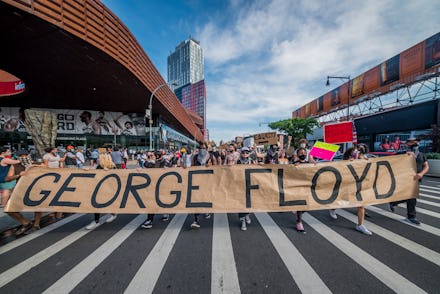"It's different this time": How nationwide protests are creating momentum for real change

The fight against structural racism in the United States has never felt as focused or widely sustained as it does in this moment. In an effort to dismantle the racism that has long pervaded every crevice of this country, thousands of protesters have mobilized nationwide, united by a simple shared belief: Black Lives Matter. It's been two weeks since they have taken to the streets, and they show no signs of stopping.
In fact, with each passing day, the protests only seem to gain momentum, and the pressure radiating from them can be felt across nearly every aspect of life. Social media is no longer home to quotidian details of life in quarantine. Instead, platforms like Instagram and Twitter have become places to educate yourself on civil rights, find out where the latest protest is happening, learn about how to fight for social change, talk to your racist family members, or be a better ally.
Shiny social media campaigns trying to pass as activism efforts that might have worked in the past (see: those inane black boxes on Instagram) were quickly called out for being harmful to the communities they claimed to support. Celebrities were taken to task for misspeaking, under-participating, and posturing as allies. Brands have been held to account for leeching onto the movement without aligning their business practices with their newly-stated values. Actual (donation) receipts were demanded. The emphasis, above all, has been on legitimate action. What have you done for the Black community that isn't performative? How are you actually moving the needle?
America's perverse inequalities were already amplified by coronavirus, but when the video of George Floyd's callous killing circulated, Americans' frustrations with a system that simply wasn't serving them — that, in fact, wasn't built to serve them in the first place — were laid bare, the raw nerve exposed.
And while it isn't the first time Americans have taken to the streets to in response to police brutality, it's the first time they don't have anywhere to redirect that anger or anything to distract from it. A staggering number of Americans are unemployed. Most still haven't returned to work, school, or any semblance of their normal routines. Not having those outlets has allowed protesters time to tread the pavement with a tight, singular focus on their primary demand: defund the police.
That emphasis on tangible outcomes is part of what makes this movement distinct. While movements like Occupy Wall Street and the Women's March faded due to ideals that weren't actionable, this new wave of civil rights protests took just a week to turn what might have seemed like a radical rallying cry into a reality.
Los Angeles Mayor Eric Garcetti has vowed to cut $150 million from the city's police force and reinvest that money into communities of color. Mayor Bill de Blasio, after initially appearing to defend the actions of local law enforcement, agreed to cut funding for the New York Police Department.
The protests haven't been without opposition. As activists and demonstrators rallied against police brutality, many became victims of police brutality themselves. Violence against protesters proliferated, seemingly unchecked. Journalists were targeted and attacked by police as President Trump's anti-media rhetoric brutally materialized. None of this is new; police have used these types of tactics against Black protesters for generations.
Beyond a spirit of endurance, these protests are characterized by a certain insatiability for justice — the small wins aren't nearly enough. News of the Minneapolis police officer Derek Chauvin being charged for the murder of Floyd couldn't tamp down their tenor. Discussions about defunding the police are celebrated but don't satisfy. A complete and total end to inequality and the mistreatment of Black people — in both ways big and small, from microaggressions to murder — is what protesters and activists are demanding.
The collective desire for change has never been more urgent — and never felt more within reach.